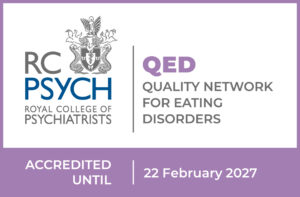Food challenges on the eating disorders unit at Nightingale Hospital
Anita Gaisford, a specialist eating disorders therapist, shares a recent update from the eating disorders unit at Nightingale Hospital.
“Restricting the range of foods one eats is a common behaviour amongst those with eating disorders. Having cake is a normal part of any social and celebratory experience such as a birthday, Christmas, or Easter. However, for a person suffering from an eating disorder, this can become a major ‘fear’ or ‘forbidden’ food that is maintained by a set of rigid rules”, explained Anita.
“An important part of recovery includes exposure to such ‘fear’ foods in an effort to normalise them. What better way to encourage this, than to introduce specially designed cakes to our patient community to celebrate the Queen’s Platinum Jubilee.”
 .
.
Pictured from left: Anita Gaisford, Vicky, Dr. Natalie Stechler and Kundi were on hand with smiles and encouraging words to support inpatients.
Eating disorder treatment at Nightingale Hospital
At Nightingale Hospital, eating disorder treatment can be accessed as part of an outpatient, day patient or inpatient programme.
We are dedicated to delivering individually tailored and quality care for individuals aged 18 years and above. Our eating disorder treatments (whether for anorexia, bulimia, binge eating disorder (BED) , or other specified feeding or eating disorders (OSFED) are based on current clinical evidence.
Our multidisciplinary team is led by consultant psychiatrists, who are supported by ward doctors, specialist nurses, dietitians, and a specialist therapy team including psychologists, cognitive behavioural therapists, family therapists, and occupational therapists.
Nightingale Hospital has a Quality Eating Disorder accreditation, provided by the Royal College of Psychiatrists. This means that when you’re seeking eating disorder treatment at Nightingale Hospital, you can be sure that you will be receiving trusted and effective clinical care of the highest degree.

Our team is led by one of the UK’s leading clinicians for the treatment of eating disorders, Dr Helen Murphy, consultant psychiatrist.
What happens in eating disorder treatment?
Your eating disorder team will work in partnership with you, helping you recover and reach your goals while offering intensive psychological and emotional support through group therapy sessions, individual counselling, psychotherapy, individual keyworker nursing sessions, dietary guidance and family therapy.
Outpatient eating disorder treatment at Nightingale Hospital
Although inpatient treatment can be the most effective treatment for those with a severe eating disorder, we understand that there are times when this type of care may not be feasible. In situations such as this, patients can be supported in an outpatient setting. Outpatient treatment is available through one-to-one consultations with consultant psychiatrists, therapists or dieticians specialising in eating disorders.
Day patient eating disorder treatment at Nightingale Hospital
Our eating disorder day therapy programme offers flexible treatment options that take into consideration patients’ usual daily responsibilities, such as working, family life or study.
Participation can be on a full or half-day basis.
Inpatient eating disorder treatment at Nightingale Hospital
Inpatient treatment can be very helpful in supporting a patient to start the process of recovery, especially if they are physically compromised, isolated and lack social support. It can also be highly appropriate for patients who find they need further support than outpatient or day therapy can provide.
It provides intensive 24-hour care with structured and supported eating coupled with an intensive daily therapy programme. It can be invaluable for patients who struggle to cope independently at home and find it difficult to challenge and manage their eating disorder behaviours alone.
Inpatient treatment can also be a huge source of emotional support and provide medical intervention for those whose low weight leaves them physically vulnerable. Patients are made to feel safe, nurtured and supported around the clock.
Specially trained eating disorder nursing staff are highly skilled in supporting patients who struggle to eat. Patients are carefully guided to recognise and challenge their use of maladaptive behaviours such as vomiting or exercise to manage their distress.
Our therapy programme consists typically of four therapy groups a day. These therapies provided are in line with NICE Guidelines and include a CBT-E group, an emotional regulation group, a body image group and a nutrition group. Our clinical team is made up of a dynamic range of therapists, all of whom are skilled in working in different modalities.
Eating disorder therapy treatment can include
- Cognitive behavioural therapy
- Family therapy
- Individual and group therapy sessions
- Occupational therapy
- Enhanced Cognitive Behavioural Therapy (CBT-E)
- Managing feelings, emotion regulation and distress tolerance
- Psychotherapy groups
- Mindfulness-Based Cognitive Therapy (MBCT)
- Occupational therapy
- Wellbeing therapies
- Nutrition education
- Creative expression and writing
- Body image workshops
- Self-expression
- Identity
- Yoga
- Excursion activity
- Relapse prevention
- Art, drama and music therapy
- Cooking meals
- General exercise when appropriate
Care plans also include meals with family members, aimed at rehabilitating a patient back into the home environment.
Related Conditions
- Anorexia nervosa
- Bulimia nervosa
- Binge eating disorder (BED)
- Other Specified Feeding or Eating Disorders (OSFED)








